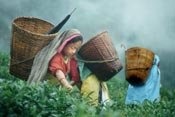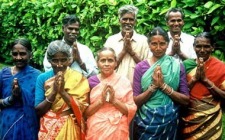Meet Our Tea Producers
Tea must be of highest quality. Tea must be organically grown and certified. Tea estates must be environmentally and socially responsible with a proven record. Wherever possible, the estate must be Fair Trade certified, or meet or exceed their criteria. |
Fatikchera Tea Garden (Tripura, North East India)
Fatikchera compromises 200 hectares of tea, situated 20 kms from the capital city - Agartala. The garden commenced in-conversion organic practices from 1999 and was certified organic in 2002. The garden has developed an in-house technology for a very important input - compost; generating large employment opportunities in an otherwise rural non-industrial area. The garden has a school sponsored by the government and a dispensary manned by a Para-medic. To further improve its soil fertility, the garden adopted Bio Dynamic practices in 2003, keeping with its commitment to organic agriculture. The processing plant is fully geared to handle the production of black and green teas, unique in flavor and made under stringent quality control measures. Regular in-house audits of the factory and the cultivation system ensure a product that is hygienic, consistent and with a promise of the mystic of the remote North East India. |
Stassen Group (Shri Lanka)Our Irish breakfast, Earl Grey and Green teas come to you from the Stassen Group, the first and one of the largest producers of certified organic teas in the world. They have been producing organic black and green teas for over fifteen years in Ceylon ( Shri Lanka). Their organic tea projects are inspected annually and certified by Natureland of Germany and NASAA of Australia. They use organic and biodynamic methods of agriculture with composting and the use of redworms to produce fertilizer.Cultivation practices are carried out according to the biodynamic calendar. Homeopathic solutions, minerals and organic nutrients are applied to the plants and the soil to enhance growth, harvest and resistance to pests and diseases. Company provided health care, sanitation, good living conditions, maternal and child welfare for the workers demonstrates Stassen?s commitment to the community. They have constructed new houses, developed rural banks and income generating projects for the community. Their website www.stassengroup.com gives further information and photos of worker owned cattle shed, basket weaving and many other socially responsible community projects. Stassen is Fair Trade certified. The teas are grown at elevations of 3600-4200 feet. |
Bombay Burmah (South India)Our Oothu Pekoe tea (Oothu means spring water in south India) comes from the estate of Bombay Burmah in the hills of south India. They are the largest single producer of organic tea in the world. The organic cultivation started in 1988 and today they produce 18 million pounds of organic tea annually. The nutrition for the plants is provided by the use of vermiculture and large scale composting. All pest and disease control is carried out by purely natural methods. They have been certified by EEC and IFOM. The organic estate called Singampatti lies at the southernmost tip of the western ghats (range) of India. Out of a total of 8000 acres only 2000 is cultivated under tea. About 1200 acres are left untouched serving as a corridor for the movement of the Lion tailed Macaque monkies. Another 700 acres are set aside for watershed to supply water to the people living in the plains below. 65% of the original 8000 acres are left as virgin jungle, a tropical rainforest. 8 windmills provide all the electricity that is used. The estate provides childcare, medical facilities and housing for the employees. |
Selim Hill (Darjeeling, north India)Our Darjeeling Black Orthodox tea comes to you from the Selim Hill project. Situated in Tindharia (three waterfalls) in Darjeeling, the garden elevation range from 2000 feet to 4500 feet. The garden has about 539 acres under forestation, which provides a sanctuary for wildlife. They employ 275 permanent and 200 temporary workers. The plantation forms an immense carpet on the slopes of the Himalayan foothills. The plants are terraced on 45-degree hillsides where the tea has to be harvested by hand. Selim Hill produces one of the liveliest Darjeeling teas, considered the "Champagne" of black teas, grown and processed in the orthodox tradition. They are certified by IMO and EEC. Their commitment to their workers' welfare and community improvement is attested by registration with Fair Trade. |
Korakunda (South India)Our Korakundah decaffeinated tea comes to you from the Korakundah estate in the Nilgiri region in southern India. Nilgiri means blue mountain range. Pristine streams and virgin forests surround the estate. They use natural processes and organic manure untouched by chemicals. Vermiculture is used extensively. Earthworms provide plant growth by aerating the soil, promoting drainage and drawing organic materials into their burrows where it decomposes faster. They are 100% organic certified by IMO and IFOAM. Tea is grown at 8200 feet, thus greatly enhancing the flavor.The estate provides the workers with housing, medical facilities, and educational institutions. The estate does not employ anyone less than 18 years old. Children with the aptitude are sponsored for higher education in engineering, agriculture and medicine. It is the first tea plantation in south India to obtain Fair Trade certification. |



